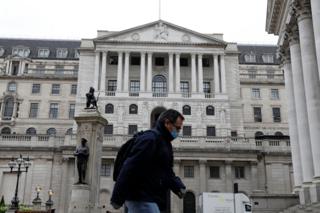Bank of England warns of deepest recession on record

Image copyright
Getty Images
A man walks past the Bank of England in London
The Bank of England has warned that the coronavirus pandemic will push the UK economy towards its deepest recession on record.
It said the economy was on course to shrink 14% this year, based on the lockdown being relaxed in June.
Scenarios drawn up by the Bank to illustrate the economic impact said Covid-19 was “dramatically reducing jobs and incomes in the UK”.
Policymakers voted unanimously to keep interest rates at a record low of 0.1%.
However, the Monetary Policy Committee (MPC) that sets interest rates was split on whether to inject more stimulus into the economy.
Two of its nine members voted to increase the latest round of quantitative easing by £100bn to £300bn.
The Bank’s analysis was based on social distancing measures being gradually phased out between June and September.
The Bank’s scenario showed the UK economy plunging into its first recession in more than a decade. The economy shrinks by 2.9% in the first quarter of 2020, followed by an unprecedented 25% decline in the three months to June.
This would push the UK into a technical recession, defined as two consecutive quarters of economic decline.
Rebound
For the year as a whole, the economy is expected to contract by 14%. This would be the biggest annual decline on record, according to Office for National Statistics (ONS) data dating back to 1949.
It would also be the sharpest annual contraction since 1706, according to reconstructed Bank of England data stretching back to the 18th Century.
While UK growth is expected to rebound in 2021 to a record 15%, the size of the economy is not expected to get back to its pre-virus peak until the middle of next year.
The UK government is expected to start easing lockdown restrictions next week.
However, the Bank assumes job losses and shrinking pay packets will continue to weigh on the recovery, with British families remaining cautious about shopping and socialising for at least another year.
It also assumes:
- The government’s jobs retention scheme covering 80% of wages is phased out with the lockdown
- Companies stop or scale back their operations for some time.
- Cautious consumers voluntarily maintain social distancing until mid-2021.
Average weekly earnings are expected to shrink by 2% this year, reflecting the fall in wages for furloughed workers.
The Bank said sharp increases in benefit claims are “consistent with a pronounced rise in the unemployment rate”, which is expected to climb above 9% this year, from the current rate of 4%.

